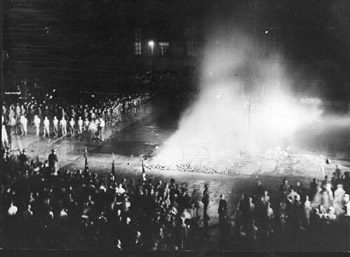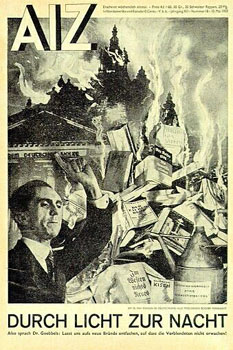

Book Burning 1933, 1
Book Burning 1933, 2
Book Burning 1933, 3
In 1933, Nazi Minister for Popular Enlightenment and Propaganda Joseph Goebbels began the synchronization of culture (Gleichschaltung), by which the arts were brought in line with Nazi goals. The government purged cultural organizations of Jews and others alleged to be politically or artistically suspect.
On 6 April 1933, the German Student Association's Main Office for Press and Propaganda proclaimed a nationwide “Action against the Un-German Spirit,” to climax in a literary purge or “cleansing” (Säuberung) by fire.
In a symbolic act of ominous significance, on May 10 the students burned upwards of 25,000 volumes of “un-German” books, presaging an era of state censorship and control of culture. On the night of May 10, in most university towns, right-wing students marched in torchlight parades “against the un-German spirit.” The scripted rituals called for high Nazi officials, professors, rectors, and student leaders to address the participants and spectators. At the meeting places, students threw the pillaged and unwanted books into the bonfires with great joyous ceremony, band-playing, songs, “fire oaths,” and incantations.
Not all book burnings took
place on May 10, as the German Student Association had planned. Some were
postponed a few days because of rain. Others, based on local chapter preference,
took place on June 21, the summer solstice, a traditional date of celebration.
Nonetheless, in 34 university towns across Germany the “Action against the Un-German Spirit” was a success,
enlisting widespread newspaper coverage. And in some places, notably Berlin,
radio broadcasts brought the speeches, songs, and ceremonial incantations “live” to
countless German listeners.